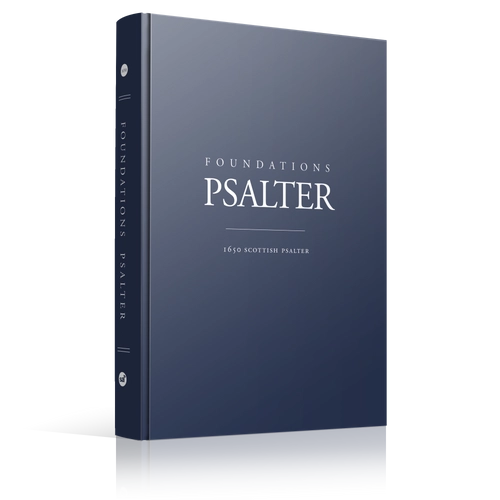The Psalms as Worship, Confession, and Catechesis
Two months ago, our congregation made a few intentional changes to the order of worship. One major change was to sing only from the psalter. To support this, the church purchased for every member their own copy of the Foundations Psalter (the 1650 Scottish Psalter), produced by SermonAudio. Each Lord’s Day, we now sing a total of four psalms during the service. Since making this change, it has become increasingly clear just how rich these songs are, not only in their beauty and power but in their theology. The psalms are not mere poetry or expressions of devotion; they are divinely inspired confessions that press into our hearts the very truths that lie at the center of the New Testament.
The Theology of the New Testament in the Psalter
The psalter is the church’s oldest hymnbook, but it is also a Christ centered theological manual in song. The apostles themselves demonstrate this. Peter, Paul, and the author of Hebrews repeatedly appeal to the psalms to explain the person and work of Christ. What we discover when we sing them is that the theology of the New Testament is already contained in these inspired songs.
Psalm 2 sets forth Christ’s kingship. The nations rage, but the Lord has set His King on Zion. The apostles in Acts 4 interpret this psalm as fulfilled in Christ’s exaltation. Every time we sing Psalm 2, we proclaim that Jesus Christ is Lord, reigning over the nations, and that His kingdom will never be shaken.
Psalm 23 speaks to the believer’s union and communion with Christ. The Lord is our Shepherd who provides, protects, and leads His people even through the valley of the shadow of death. In John 10, Jesus identifies Himself as the Good Shepherd, making Psalm 23 a direct confession of His saving care for the flock.
Psalm 32 proclaims the blessedness of justification: “Blessed is the one whose transgression is forgiven, whose sin is covered.” Paul quotes this psalm in Romans 4 as proof that righteousness is imputed by faith and not by works. To sing Psalm 32 is to rejoice in the gospel of grace.
Psalm 72 points us to Christ’s worldwide reign. It speaks of the King who brings justice, delivers the needy, and whose dominion stretches “from sea to sea.” This psalm fuels our hope in the Great Commission, anticipating the day when the earth will be filled with the knowledge of the glory of the Lord as the waters cover the sea.
Psalm 110 is the psalm most often quoted in the New Testament. It proclaims Christ’s exaltation to the right hand of God and His eternal priesthood. Hebrews builds an entire argument for the priesthood of Christ upon this psalm. To sing it is to confess the ascension, intercession, and victory of our Lord.
These are only a few examples, but they show how thoroughly New Testament theology is woven into the psalter.
The Westminster Standards on Singing as a Means of Grace
The Westminster Assembly was clear about the place of psalm singing in the worship of God. In WCF 21.5 they wrote that among the ordinary parts of worship are “the reading of the scriptures with godly fear; the sound preaching, and conscionable hearing of the word, in obedience unto God, with understanding, faith, and reverence: singing of psalms with grace in the heart; as also the due administration and worthy receiving of the sacraments instituted by Christ.” Singing is not an optional ornament, but one of the divinely appointed elements of worship.
More broadly, the divines remind us in WLC 154 that the outward and ordinary means by which Christ communicates the benefits of His mediation are His ordinances, especially the Word, sacraments, and prayer. Singing fits within that category as an aspect of the ministry of the Word, making Christ and His truth effectual to the hearts of His people.
Finally, the Shorter Catechism Q. 89 teaches that “the Spirit of God makes the reading, but especially the preaching of the Word, an effectual means of convincing and converting sinners, and of building them up in holiness and comfort, through faith, unto salvation.” Singing psalms is one of the ways the Word is impressed upon us, laid up in our hearts, and practiced in our lives.
When the church sings the psalms, it is not ornamenting worship but engaging in a means of grace. These inspired songs impress the truths of Christ and His kingdom upon the memory, stir up holy affections, and shape our minds according to the Word of God.
Worship, Confession, and Catechesis
Singing the psalter is therefore a threefold act. It is worship, as we give glory to the Triune God for His works of creation and redemption. It is confession, as we unite our voices in declaring the doctrines of the faith once for all delivered to the saints (Jude 3). And it is catechesis, as the inspired songs of Scripture train us in the language, categories, and hope of God’s Word.
Our renewed focus on the psalter, singing four psalms each Lord’s Day, has reminded us that these songs are not optional. They are God’s appointed way of shaping His people in truth and praise. To sing them is to enter into the rich theology of the New Testament, to confess Christ with one voice, and to be built up by the Spirit through the Word He inspired.
The psalms are not only beautiful; they are indispensable to the life and health of the church.


